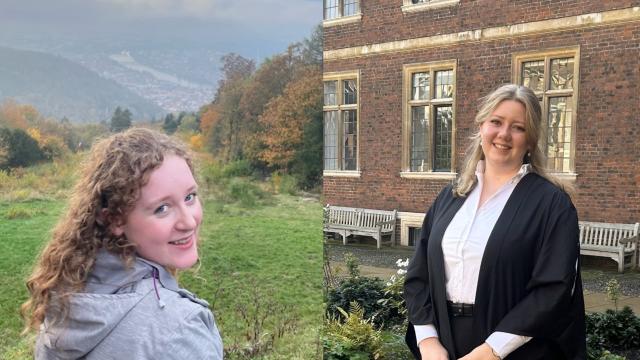
The United Kingdom has a rich tradition of campanology or bell ringing – Georg Friedrich Händel is credited with labelling the country a “ringing isle” – and a group of St Catharine’s campanologists are planning to celebrate upcoming milestones in the College’s history by ringing church bells. It is believed that 2023 will be the first time that six members of St Catharine’s have made up a complete bell ringing band.
Cambridge’s connection to bell ringing
The modern very British practice of change ringing can be traced back to the 17th century when Fabian Stedman (1640–1713) became Parish Clerk at St Bene’t’s in Cambridge from 1670. He published two books highlighting the principles by which today’s ringers learn their art; Tintinnalogia (1667) and Campanalogia (1677). Two of the ringing methods described in Tintinnalogia, Plain Bob and Grandsire are to be used by the St Catharine’s band later this year.
Meet the Catz campanologists
The idea of ringing for the college’s 550th anniversary started in June when alumnus Dr Graham Darke (1976, Engineering) wondered if there were sufficient ringers from the St Catharine’s community who were still active. The Cambridge University Guild of Change Ringers was approached and five ringers kindly responded:
- Paul Johnson (1959, Mathematics)
- Ken Darvill (1963, Mathematics)
- Peter Cresswell (1965, Archaeology and Anthropology)
- Dr Graham Turnock (1986, Natural Sciences)
- Oliver Winkless-Clark (a third-year Law undergraduate)
Graham explains, “Because the six of us had varied ringing experience and none knew each other already, we decided to meet for two practice rings. The first was at Wookey in August with a successful quarter peal of 1260 Plain Bob Doubles. Full credit goes to Gray Turnock who hadn’t touched a bell rope in 25 years!”
As a second practice session, a different selection of four St Catharine’s ringers and four guest ringers will ring the eight Royal Jubilee Bells at St James, Garlickhythe in London at approximately 2–3pm on 7 October. This will be to both wish Sir John Benger (1979, English) well as he starts his term as the 40th Master of St Catharine’s and acknowledge the centenary of the St Catharine’s College Alumni Society.
Celebrating the College’s 550th anniversary
The full group and friends are planning to ring at a series of churches in Cambridge over the final weekend in November to mark the 550th anniversary of St Catharine’s, which was founded on 25 November 1473.
Saturday 25 November
- A peal at the Church of St Andrew the Great in the morning (10am) with a new method named after St Catharine’s with support from the Cambridge University Guild of Bellringers.
- A quarter peal in Histon at 7–8pm with support from Cambridge University Guild of Change Ringers.
Sunday 26 November
- A quarter peal of Plain Bob Doubles by the full group at 2–3pm at the Church of St Bene’t (the closest church to St Catharine’s and where the pioneer Stedman rang).
- 550 changes of Grandsire Doubles at St Clement’s at 4–4.30pm.
Sir John Benger (1979, English; 2023), Master of St Catharine’s, commented:
“There is a rich programme of activities planned to enable the St Catharine’s community to celebrate our 550th anniversary in the weeks ahead, and it has been great that alumni from around the world have been getting in touch to tell us about their plans. Thank you to Graham and the other five Catz campanologists for kindly volunteering their time to celebrate our history. It will be magical to hear bells ringing out for us in London on 7 October and Cambridge on 25 and 26 November.”
For more information about the College's 550th anniversary celebrations, please visit caths.cam.ac.uk/550.




